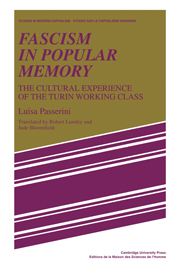III - ORAL SOURCES AND THE HISTORY OF THE EVENTS OF EVERYDAY LIFE
Published online by Cambridge University Press: 04 August 2010
Summary
The focus of this part of the book is on the small-scale, everyday events recounted by the subjects. These events are usually regarded as insignificant and irrelevant in historical terms. They consist of ordinary matters, like deciding whether or not to have children, and exceptional ones, like the visit of figures of authority. The reconstruction of this type of event with the help of oral sources leads to analysis of ‘mentalities’.
Once again, one is faced with sets of attitudes which are not fixed but change depending on whether one is dealing with ideologies of work or maternity, or with the sense of belonging to a place. Likewise, analysis needs to take account of the processes whereby traditions came into being. For example, in retrospect, Mussolini's visit to Mirafiori in Turin has acquired a symbolic importance. The fact that stories are passed down serves to prolong the life of a cultural identity or self-image. Oral traditions have circular and mutually reinforcing tendencies.
Memory is selective. In particular, it gives prominence to moments of individual and collective decision-making. Though it does not pass over ambivalent attitudes and acquiescent behaviour in relation to Fascism, it mostly presents them as another face of dissent. Memory tends, in fact, to elaborate what is narrated until it becomes meaningful in a contemporary context, depending, of course, on the period and events being recalled.
- Type
- Chapter
- Information
- Fascism in Popular MemoryThe Cultural Experience of the Turin Working Class, pp. 127 - 128Publisher: Cambridge University PressPrint publication year: 1987



